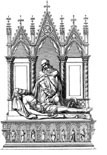
A Tale of Two St. Mary’s Churches
DO THEY BELONG TO THE SAME RELIGION?
It was Pentecost Sunday 1999, and we were headed to 8 a.m. Mass at St. Mary’s Church in upstate New York. We — my wife, kids, and I — had traveled from Pennsylvania to visit my wife’s family, and I decided to take my kids (my wife had other obligations) to St. Mary’s where Grandma is a Eucharistic minister.
At 7:45 a.m. we entered St. Mary’s and briefly stopped to observe her modern interior design. It was not exactly the traditional rectangular church with the altar at one end and an entrance at the other. St. Mary’s is rectangular, but the “altar area” is located near the middle of the nave, not at the end. Multiple banks of pews face the altar area, some at an angle, surrounding it on three sides. The nave is devoid of statues and artwork. It appeared more like an auditorium than a place of worship.
While the interior seemed odd to me, I was there to worship God, not rate the architecture. So we genuflected and entered our pew where I would kneel and offer up my prayer intentions for the Mass. And kneel I did, on the hard terrazzo floor, for this church has no kneelers. As always before Mass, I lifted my head to focus on the Tabernacle in silent prayer. I cast a glance into the “sanctuary,” but there was nothing that looked even remotely like a Tabernacle. I then panned the nave and still saw no Tabernacle.
At this point, I wondered if I had inadvertently taken my kids to a non-Catholic church. I hadn’t quizzed Grandma on her place of worship. I assumed she was Catholic; after all, she was a Eucharistic minister at St. Mary’s. I began to perspire as I tried to make sense of my surroundings.
You May Also Enjoy
Students, a new cohort of faithful faculty members, and orthodox bishops are beginning to pay more attention to what is happening on Catholic campuses.
Lying and other deceptions in communication are intentional untruthfulness: They are attempts to express outwardly,…
All our institutions are infested with corrupt language, whose impetus is to tear down all present realities and replace them with vain and avaricious desires.

